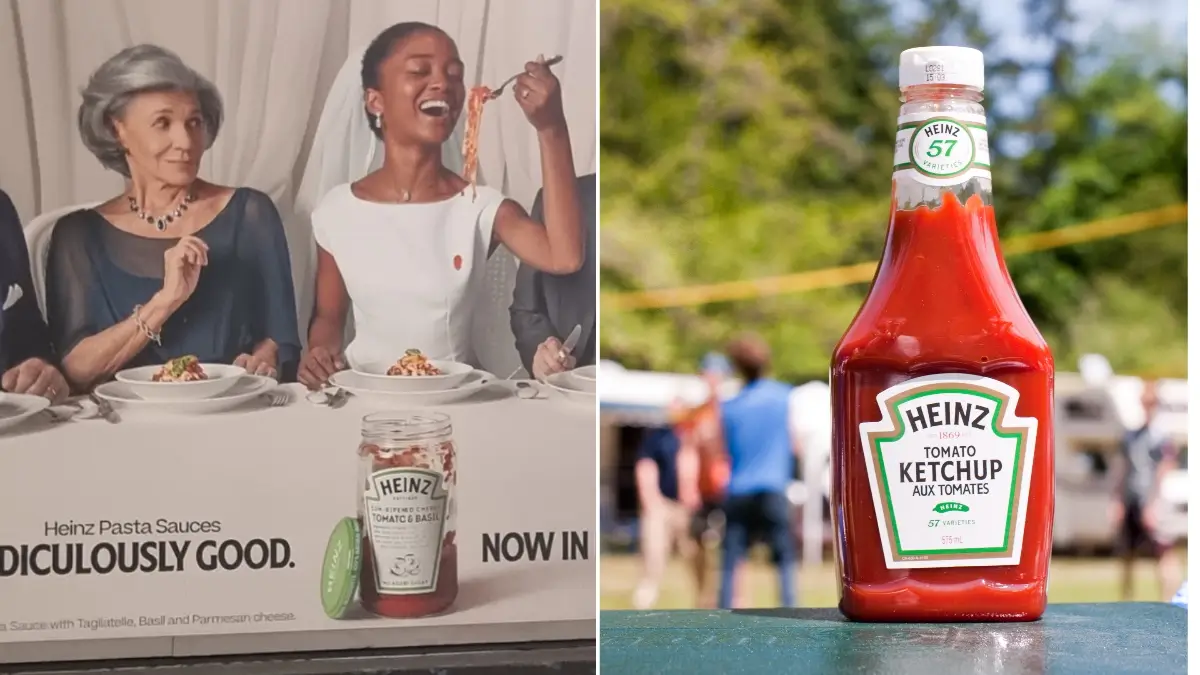Ketchup behemoth Heinz was recently criticized for omitting a Black father from a wedding scene in a U.K. advertising campaign. After a critique of the image went viral on social media, the company apologized, but it left a bad taste in many people’s mouths.
The controversial ad featured a Black bride in a wedding dress enjoying a forkful of spaghetti surrounded by her white in-laws on one side and her white husband and Black mother on the other. Heinz is hawking a new line of jarred pasta sauces in England, and the mural-sized posters ran in several London subway stations. Despite the red sauce stain on her pristine white wedding dress, the bride seems oblivious to the disapproving stares from her new family.
While the father of the groom was present at the “head table,” the bride’s father was strangely missing, sparking some confusion. Many felt the image perpetuated the stereotype of the “absent” Black father — in this case, one so disengaged that he did not show up to his own daughter’s wedding.

In the viral post on X that garnered nearly half a million views, British writer Nels Abbey shared a photo of the ad from a London tube station with the caption, “For my brothers with daughters. Because, believe it or not, Black girls have dads too.”
“Total erasure of Black fathers by such a mainstream brand is shocking. How did this get approved?” quipped another, echoing many comments.
In response, Heinz issued an apology via The Independent, a British online newspaper: “We always appreciate members of the public’s perspective on our campaigns. We understand how this ad could have unintentionally perpetuated negative stereotypes. We extend our deepest apologies and will continue to listen, learn and improve to avoid this happening again in the future.”
But many people found Heinz’s apology disingenuous. “This would’ve gone through many rounds of approval, both by the ad agency and Heinz itself. This was without a doubt intentional,” pointed out an observer.
Several agreed with the sentiment, including one person who posted, “Advertising campaigns float past desks BEFORE they get authorised to publish. Heinz chose this path ignorantly. I don’t know if they didn’t think about this or didn’t care. Possibly because bad publicity is still publicity. Not everyone grew up fatherless in our community. #Sad.”
Instagram account “Screenshothq” noted a particular lack of sensitivity, given that October is Black History Month in the U.K.
Heinz tapped the creative agency VML in Spain to create a campaign celebrating a rebellious love of their new line of pasta sauces, citing an evolved “visual code.”
“The new family size range deserved doubling down on humour and evolving the brand’s visual code to make room for showing unexpected families enjoying the product irresistibility. Keeping the Ridiculously Good platform ownable tone of voice,’ said executive creative director Paco Badia in a recent interview.
Interracial ads have become increasingly popular in an attempt to reach a broader audience and signal inclusivity to potential customers. However, even mixed-raced ads rarely show Black men. One study found that 70 percent of interracial commercials from 2018 to 2021 showed a Black woman with a white man, according to Morgan State University Professor Jason Johnson, per Voice of America. Unfortunately, the “unexpected family” that advertisers seem to love is not necessarily a mirror of real life and, in the worst cases, can sell tired old stereotypes along with their products.
However, Heinz’s apology for the campaign may have fallen flat, leading them to apologize twice in one week.
On Monday, the company issued a statement over its “Smiles” campaign, which featured people grinning with ketchup smeared around their mouths, reports show. However, one of the images showed a Black man, and critics argued it “strongly resembled blackface and minstrel shows from the 19th and early 20th centuries, where Black men—portrayed by white actors—were given exaggerated, clownish features, often including large red lips,” according to PR Week.
“As a consumer-obsessed company, we are actively listening and learning, and sincerely apologize for any offense caused by our recent ‘Smiles’ campaign,” a spokesman said. “Although it was intended to resonate with a current pop culture moment, we recognize that this does not excuse the hurt it may have caused. We will do better. We are working to remove the advertisement immediately.”


